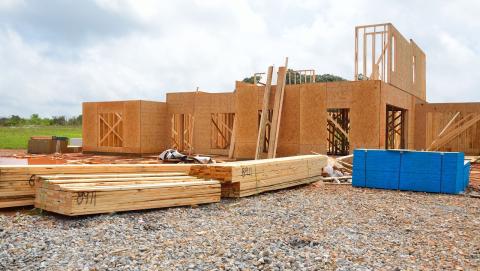
National Housing Strategy Funding, Ontario Health Teams, Enhancing Digital Security and Trust, Building Code, Affordable Housing Bulletin & Planning Submissions
National Housing Strategy
Last week, Minister Fraser wrote to municipal Social Services Commissioners and DSSAB CEOs confirming the federal government’s intention to flow National Housing Strategy funding directly to Service System Managers. AMO, OMSSA, and NOSDA sent joint letters to Minister Fraser and to the Premier and Minister Calandra, respectively, highlighting the need for collaborative tri-lateral federal-provincial-municipal discussions to stabilize National Housing Strategy funding and implementation.
AMO will continue to work with OMSSA and NOSDA to engage federal and provincial officials to ensure that the individuals and families relying on these programs are not adversely impacted.
Proposed New Regulations for Ontario Health Teams
Last month, AMO submitted comments on proposed new Ontario Health Teams (OHTs) regulations. The proposed regulations include creating a not-for-profit coordinating corporation and a primary care network as well as demonstrating home care readiness.
AMO continues to push for municipalities to have a say in health systems planning. We’ve asked for stronger OHT governance and for municipalities to have a seat at the table for the new non-profits. The submission also highlights the importance of ongoing funding from the province for municipalities as OHTs develop.
AMO will continue to work with the Ministry of Health and Ontario Health on the appropriate role and relationship for municipalities and OHTs.
Enhancing Digital Security and Trust
The province has recently proposed legislation to better protect children’s privacy and data in provincial settings. Bill 194 also includes enabling provisions allowing the province to create regulations requiring public sector entities, including municipalities, to develop and implement cyber security programs and technical standards respecting cyber security.
AMO will looks forward to working collaboratively with the province to develop effective solutions for the municipal sector on this important issue.
Next Edition of the Building Code Released
The Ministry of Municipal Affairs and Housing released the 2024 Building Code which will come into effect on January 1, 2025. The new code moves towards harmonization with the National Construction Codes with some exceptions, notably that the code does not harmonize with national energy efficiency standards and retains provincial flexibility on minimum sizes for secondary suites. The new Building Code regulation is only one page long, referencing the national building code and the 2024 Ontario Amendment document for the differences in the province.
AMO has sent a letter to the Minister of Municipal Affairs and Housing expressing concern that the code does not harmonize with the national energy efficiency standards, and will continue to advocate for the inclusion of green building standards in the Ontario Building Code.
Province Releases Affordable Housing Bulletin
The government’s Affordable Residential Units bulletin clarifies how municipalities exempt affordable housing from development charges, as Bill 23 mandated. This takes effect June 1, 2024.
AMO looks forward to working with the province on key implementation issues, including:
- Preventing “micro-condos” by adding minimum size requirements to the bulletin
- Creating compliance tools to ensure new housing is rented and sold at an affordable price
- Improving data accuracy for local home sale and rental costs, and
- Providing a municipal-owner standard agreement ensuring affordability for 25 years.
AMO’s Submission to Bill 185 Consultations
AMO provided a submission to the Ministries of Municipal Affairs and Housing and Energy on Bill 185 and related Environmental and Regulatory Registry postings.
A summary of the top comments is below, and you can read more about AMO’s ongoing advocacy on land use planning and housing on our compendium page.
Development Charges (Regulatory Registry 24-MMAH006)
Bill 185 takes significant steps towards restoring municipalities’ ability to fund growth-related infrastructure by repealing the mandatory five-year phase-in of new DC rates and restoring studies as eligible DC expenses. To enable municipalities to keep pace with growth infrastructure needs, AMO continues to call on the province to reinstate the cost of land and housing services as eligible DC expenses.
Minister’s Zoning Orders (Regulatory Registry 24-MMAH010)
The government’s new framework requiring those requesting an MZO to provide timelines for downstream approvals, project completion, and demonstrate how infrastructure servicing will be addressed – a good start, but legislation is needed to ensure MZOs are only used with municipal collaboration and in situations of extraordinary urgency.
“Use it or Lose it” (Regulatory Registry 24-MMAH010)
AMO supports a new discretionary authority allowing municipalities to reallocate servicing capacity from developments that have not pulled building permits within a reasonable amount of time to make better use of infrastructure capacity and incent developers to move forward with housing.
Proposed Planning Act, City of Toronto Act, and Municipal Act Changes from the proposed Bill 185 (ERO 019-8369, Regulatory Registry 24-MMAH010)
Bill 185 introduces a number of changes intended to improve the land-use planning process. Some examples include:
- removing application fee refund provisions to reflect that all development partners impact the amount of time it takes to finalize planning approvals
- limiting third-party appeals to Official Plan and Zoning By-law decisions which will maximize local planning decisions made by municipal planners
- establishing enabling legislation to facilitate the implementation of standardized housing designs – this will be critical to meeting the proposed Canada Housing Infrastructure Fund which requires provinces allow “as of right” construction from the future federal housing design catalogue
- proceeding with downloading regional planning responsibilities to lower-tier governments – AMO has expressed concern that this will misalign land-use and infrastructure planning
- exempting public universities from the Planning Act and expediting approvals for “community service facilities” including schools and long-term care homes.
Proposed policies for a new provincial planning policy instrument (ERO 019-8462)
Alongside Bill 185, the province has released a new draft version of an updated Provincial Planning Statement (PPS). The draft walks back previous proposed policies that would have permitted lot creation in prime agricultural areas through additional severances, however ambiguity remains on when severances and settlement boundary expansions may be permitted under the new framework.
The draft PPS also includes measures to encourage intensification around transit corridors, setting local targets for affordable housing based on a reinstated definition for affordable, and encouraging a mix of housing options in designated growth areas.
AMO remains concerned about the impact of downloading environmental risks to municipalities. With the diminished role of Conservation Authorities, it will be critical to ensure appropriate resources are in place to support municipalities in managing environmental protections. The draft PPS also remains vague on Indigenous consultation and consent – amendments and detailed guidance will be required to support a shared understanding of obligations and best practices to underpin strong Indigenous-municipal relationships.
Changes Related to Newspaper Notice Requirements (ERO 019-8370)
Bill 185 responds to municipal concerns about statutory requirements for certain land-use planning notices and DC by-laws by allowing municipalities to public notice on municipal websites where no local newspaper is available. AMO will continue to encourage other ministries to coordinate changes to other public notice provisions to ensure residents maintain access to important information.
Changes to modernize leave-to-construct approvals for pipeline relocation or reconstruction projects (ERO 019-8527)
Bill 185 proposes changes that would exempt hydrocarbon pipeline relocation and reconstruction projects from seeking leave-to-consult in more circumstances, particularly where they are minor in nature and facilitate transit and housing initiatives. The changes would retain Duty to Consult requirements with Indigenous communities.



